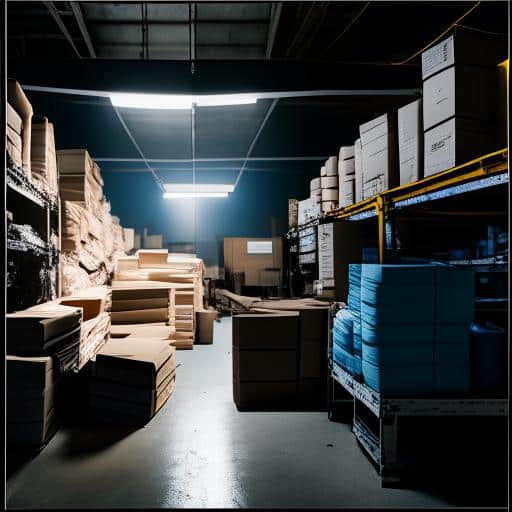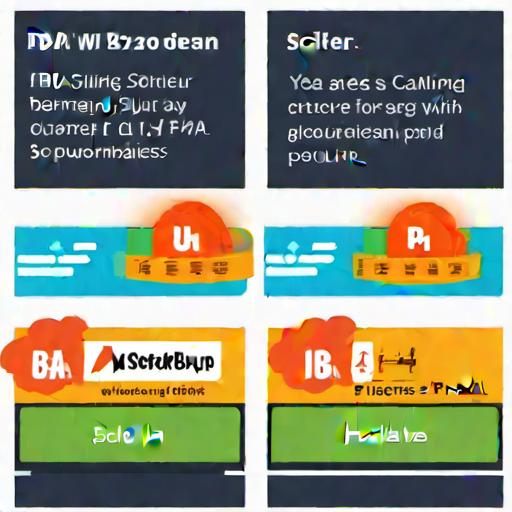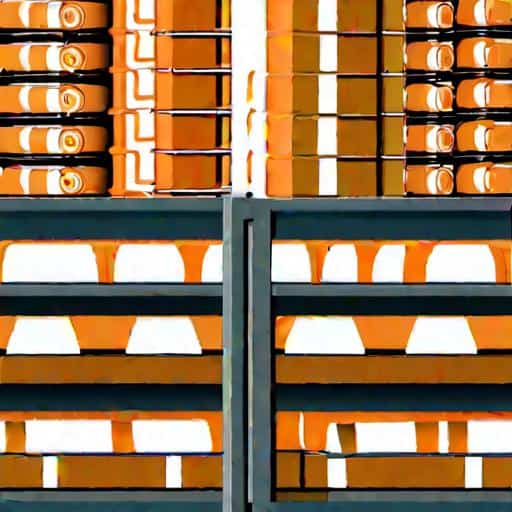
An efficient fulfillment strategy is vital for the success of ecommerce businesses, especially those selling on platforms like Shopify. Choosing the right order fulfillment method – third-party logistics (3PL) services or in-house fulfillment – can significantly impact your business’s efficiency, cost-savings, and overall growth. As an emerging ecommerce business owner who is new to supply chain management, you might need some guidance to make the best decision for your store.
FBA Prep Logistics is a 3PL warehouse located in Bristol, PA, that specializes in offering tailored warehousing and fulfillment solutions for median-sized ecommerce businesses. In this article, we will introduce the concepts of third-party logistics and in-house fulfillment, outlining their pros and cons, to help you decide which approach is best for your Shopify store. Apart from discussing the benefits of 3PL services, we will also highlight how FBA Prep Logistics can play an essential role in your business’s journey to growth and success.
Understanding 3PL Services
In this section, we will dive into the world of third-party logistics (3PL) services and the benefits they can provide to your Shopify store. As a 3PL provider, FBA Prep Logistics offers an array of services to help manage your supply chain, allowing you to focus on other aspects of your business.
A. What Does 3PL Entail?
At its core, a 3PL service is responsible for managing various aspects of your ecommerce supply chain. This includes:
- Warehousing: Storing and safeguarding your inventory until it is needed for order fulfillment.
- Order Fulfillment: Picking, packing, and shipping orders to your customers.
- Shipping: Coordinating with shipping carriers to ensure timely and efficient delivery.
- Returns Management: Handling returned items, restocking, and processing refunds or exchanges.
- Inventory Management: Tracking inventory levels and maintaining proper stock levels to prevent stockouts or overstocking.
B. Benefits of Partnering with FBA Prep Logistics
When you choose FBA Prep Logistics as your 3PL provider, you can expect notable advantages that contribute to the growth and success of your Shopify store:
- Save Time and Resources: With warehousing, order fulfillment, and shipping handled by FBA Prep Logistics, you’ll have more time and resources to allocate to other tasks like marketing, product development, etc.
- Scalability: As your business grows, FBA Prep Logistics will easily adjust to meet your increasing demands, allowing you to manage fluctuations more efficiently.
- Reduce Errors: FBA Prep Logistics’ expertise ensures that errors in fulfillment are minimized, leading to better customer satisfaction and fewer returns.
- Streamlined Inventory Management: With FBA Prep Logistics’ ample experience in managing ecommerce inventories, you can be assured of efficient inventory control, which can be further enhanced using our other resources like the “Best Shopify Inventory App for Efficient Inventory Control and Optimization in NJ.”
By leveraging FBA Prep Logistics’ 3PL services, your Shopify store can gain the expertise and resources necessary to thrive in the competitive ecommerce landscape. In the next section, we’ll explore what in-house fulfillment entails and how it compares to third-party logistics.
What In-House Fulfillment Looks Like
In this section, we’ll delve into the ins and outs of in-house fulfillment, where businesses take control over their entire fulfillment process, from receiving inventory to shipping orders without outsourcing to a 3PL provider. This option is often chosen by businesses that plan to maintain full control of their operations.
- Receiving and storing inventory: Within your own facilities, in-house fulfillment takes on the responsibility of safely storing and managing inventory. This requires adequate storage space, proper shelving units, and reliable inventory management systems.
- Processing Orders: As a business handling its own fulfillment, it’s crucial to have order processing systems in place to accurately and efficiently handle order details. This typically involves computer software or a manual system that ensures orders are correctly picked, packed, and prepared for shipping.
- Shipping and Returns: With in-house fulfillment, you are also responsible for arranging the shipping of orders to customers. This means maintaining relationships with various carriers, staying updated on shipping rates, and managing any returns that come your way.
There are several advantages and challenges to consider when opting for in-house fulfillment:
- Benefits: A key advantage of in-house fulfillment is the control that it offers businesses. This approach allows for flexibility in adjusting processes to suit specific needs and preferences. Additionally, depending on the size and scale of your business, in-house fulfillment may also lead to lower costs spent on storage and labor.
- Challenges: Handling in-house fulfillment can become a daunting task in terms of resources and time allocation. Developing, implementing, and monitoring an efficient in-house fulfillment system require significant investment, both in terms of finances and manpower. Furthermore, businesses must be able to handle rapid growth and increased order volumes without compromising on efficiency and quality of service.
In this section, we’ve explored the intricacies of in-house fulfillment and the benefits and challenges it presents for ecommerce businesses. Armed with this knowledge, you’ll be better equipped to make an informed decision about whether this approach aligns with your Shopify store’s requirements and objectives.
Comparing 3PL and In-House Fulfillment
In this section, we’ll break down the main factors to consider when deciding between 3PL and in-house fulfillment, so you can make the best decision for your Shopify store’s needs. Factors such as cost, scalability, resource allocation, control, and overall efficiency will be discussed in-depth.
-
- Cost: While in-house fulfillment may seem like a cheaper option initially, partnering with a 3PL like FBA Prep Logistics can lead to long-term savings through reduced shipping rates, better efficiency, and access to their expert knowledge. We’ll help you understand how to weigh these factors against the costs associated with managing your own operation.
- Scalability: As your business grows, so do your fulfillment needs. We’ll discuss how a 3PL, like FBA Prep Logistics, offers scalability solutions that can adapt to your store’s changing requirements, allowing you to expand seamlessly. On the other hand, in-house fulfillment may require significant investment in warehouse space, equipment, and staff.
- Resource Allocation: Managing your own fulfillment operation demands a considerable amount of time and resources. This section will outline how outsourcing to a 3PL allows you to focus on other aspects of your business such as marketing, product development, and customer service, while FBA Prep Logistics takes care of the intricacies of your supply chain.
- Control: While some businesses may be cautious about relinquishing control over their supply chain, we’ll explain how FBA Prep Logistics provides full transparency and access to real-time data through our specialized services like the best Shopify inventory app for efficient inventory control and simplified warehouse management. This allows you to maintain control while still reaping the benefits of outsourcing.
- Overall Efficiency: Lastly, we’ll highlight the overall efficiency gains afforded by partnering with FBA Prep Logistics, such as streamlining your Shopify order fulfillment and optimizing your Amazon supply chain. These efficiency upgrades can directly translate to better customer experiences and increased sales.
In this section, we’ll demonstrate how FBA Prep Logistics can offer tailored solutions to fit the needs of various ecommerce businesses, making it an ideal choice for Shopify sellers looking to focus on growth without sacrificing quality of service.
Making the Right Decision for Your Shopify Store
As we have explored in this article, the choice between third-party logistics (3PL) and in-house fulfillment is a crucial factor in the overall success of your ecommerce business, especially for those operating on the Shopify platform. By comparing the pros and cons of each approach, you will be better equipped to select the fulfillment strategy that best aligns with your business goals and available resources.
FBA Prep Logistics, a premier 3PL warehouse located in Bristol, PA, is dedicated to providing comprehensive and tailored solutions for Shopify sellers. By partnering with us, you can enjoy the numerous advantages of a 3PL service, such as improved efficiency, scalability, and reduced errors, all while continuing to concentrate on growing your business.
If you want to learn more about how our specialized services cater to ecommerce businesses, one excellent article to explore is our “Top 5 Cross-Docking Best Practices for Your Shopify Store” (INSERT URL). For those interested in warehouse management, “Simplifying Warehouse Management for Shopify Stores” (INSERT URL) offers valuable insights to help streamline your supply chain.
By considering the factors discussed in this article and exploring the extensive range of services offered by FBA Prep Logistics, you’ll be in an excellent position to choose the best fulfillment strategy for your Shopify store, ensuring your ecommerce operation’s long-term success.
Frequently Asked Questions
-
What are the key benefits of using a 3PL provider like FBA Prep Logistics?
Partnering with FBA Prep Logistics offers various benefits such as time and resource savings, easy scalability, reduced errors, and better inventory management, ultimately streamlining your overall supply chain process.
-
What does in-house fulfillment entail, and how does it differ from using a 3PL?
In-house fulfillment involves managing the entire supply chain process internally, including inventory storage, order processing, and shipping. Unlike 3PL services, this approach requires allocating dedicated resources and may potentially have lower costs depending on your business size.
-
How does FBA Prep Logistics ensure seamless order fulfillment for my Shopify store?
FBA Prep Logistics is committed to providing efficient, customized solutions designed to meet the needs of your ecommerce business. Our services include warehousing, order fulfillment, shipping, returns management, and more, assuring a positive customer experience every time.
-
Is it more cost-effective to choose in-house fulfillment or a 3PL?
Costs vary depending on your business size and individual circumstances. While in-house fulfillment might be cost-effective for smaller operations, partnering with a 3PL like FBA Prep Logistics can provide substantial cost savings and scalability benefits as your business grows.
-
How do I decide whether to use FBA Prep Logistics or manage fulfillment in-house for my Shopify store?
Consider factors such as cost, scalability, resource allocation, control, and overall efficiency when deciding between a 3PL and in-house fulfillment. FBA Prep Logistics specializes in helping businesses like yours succeed, offering tailored solutions designed to drive growth and customer satisfaction.


